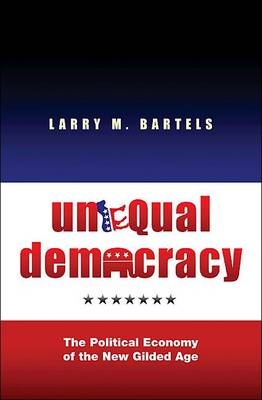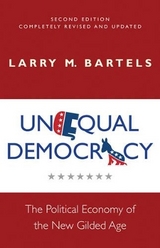
Unequal Democracy
Princeton University Press (Verlag)
978-0-691-14623-2 (ISBN)
- Titel erscheint in neuer Auflage
- Artikel merken
Using a vast swath of data spanning the past six decades, Unequal Democracy debunks many myths about politics in contemporary America, using the widening gap between the rich and the poor to shed disturbing light on the workings of American democracy. Larry Bartels shows the gap between the rich and poor has increased greatly under Republican administrations and decreased slightly under Democrats, leaving America grossly unequal. This is not simply the result of economic forces, but the product of broad-reaching policy choices in a political system dominated by partisan ideologies and the interests of the wealthy. Bartels demonstrates that elected officials respond to the views of affluent constituents but ignore the views of poor people. He shows that Republican presidents in particular have consistently produced much less income growth for middle-class and working-poor families than for affluent families, greatly increasing inequality. He provides revealing case studies of key policy shifts contributing to inequality, including the massive Bush tax cuts of 2001 and 2003 and the erosion of the minimum wage.
Finally, he challenges conventional explanations for why many voters seem to vote against their own economic interests, contending that working-class voters have not been lured into the Republican camp by "values issues" like abortion and gay marriage, as commonly believed, but that Republican presidents have been remarkably successful in timing income growth to cater to short-sighted voters. Unequal Democracy is social science at its very best. It provides a deep and searching analysis of the political causes and consequences of America's growing income gap, and a sobering assessment of the capacity of the American political system to live up to its democratic ideals.
Larry M. Bartels is the Donald E. Stokes Professor of Public and International Affairs and director of the Center for the Study of Democratic Politics at Princeton University.
Preface ix Chapter 1. The New Gilded Age 1 Escalating Economic Inequality 6 Interpreting Inequality 13 Economic Inequality as a Po litical Issue 19 Inequality and American Democracy 23 Chapter 2. The Partisan Political Economy 29 Partisan Patterns of Income Growth 31 A Partisan Coincidence? 34 Partisan Differences in Macroeconomic Policy 42 Macroeconomic Per for mance and Income Growth 47 Partisan Policies and Post- Tax Income Growth 54 Democrats, Republicans, and the Rise of In equality 61 Chapter 3. Class Politics and Partisan Change 64 In Search of the Working Class 66 Has the White Working Class Abandoned the Democratic Party? 72 Have Working- Class Whites Become More Conservative? 78 Do "Moral Values" Trump Economics? 83 Are Religious Voters Distracted from Economic Issues? 90 Class Politics, Alive and Well 93 Chapter 4. Partisan Biases in Economic Accountability 98 Myopic Voters 99 The Political Timing of Income Growth 104 Class Biases in Economic Voting 110 The Wealthy Give Something Back: Partisan Biases in Campaign Spending 116 Political Consequences of Biased Accountability 120 Chapter 5. Do Americans Care about In equality? 127 Egalitarian Values 130 Rich and Poor 136 Perceptions of Inequality 143 Facts and Values in the Realm of In equality 148 Chapter 6. Homer Gets a Tax Cut 162 The Bush Tax Cuts 164 Public Support for the Tax Cuts 170 Unenlightened Self- Interest 176 The Impact of Political Information 181 Chump Change 186 Into the Sunset 193 Chapter 7. The Strange Appeal of Estate Tax Repeal 197 Public Support for Estate Tax Repeal 198 Is Public Support for Repeal a Product of Misinformation? 205 Did Interest Groups Manufacture Public Antipathy to the Estate Tax? 214 Elite Ideology and the Politics of Estate Tax Repeal 217 Chapter 8. The Eroding Minimum Wage 223 The Economic Effects of the Minimum Wage 227 Public Support for the Minimum Wage 229 The Politics of Inaction 232 Democrats, Unions, and the Eroding Minimum Wage 239 The Earned Income Tax Credit 246 Reversing the Tide 247 Chapter 9. Economic Inequality and Po litical Representation 252 Ideological Representation 254 Unequal Responsiveness 257 Unequal Responsiveness on Social Issues: The Case of Abortion 265 Partisan Differences in Repre sen ta tion 267 Why Are the Poor Unrepresented? 275 10. Unequal Democracy 283 Who Governs? 285 Partisan Politics and the "Have- Nots" 288 Political Obstacles to Economic Equality 294 The City of Utmost Necessity 298 Selected References 305 Index 317
| Erscheint lt. Verlag | 14.3.2010 |
|---|---|
| Zusatzinfo | 4 halftones. 40 line illus. 65 tables. |
| Verlagsort | New Jersey |
| Sprache | englisch |
| Maße | 152 x 235 mm |
| Gewicht | 482 g |
| Themenwelt | Sozialwissenschaften ► Politik / Verwaltung ► Politische Systeme |
| Sozialwissenschaften ► Politik / Verwaltung ► Politische Theorie | |
| Wirtschaft | |
| ISBN-10 | 0-691-14623-3 / 0691146233 |
| ISBN-13 | 978-0-691-14623-2 / 9780691146232 |
| Zustand | Neuware |
| Haben Sie eine Frage zum Produkt? |
aus dem Bereich



